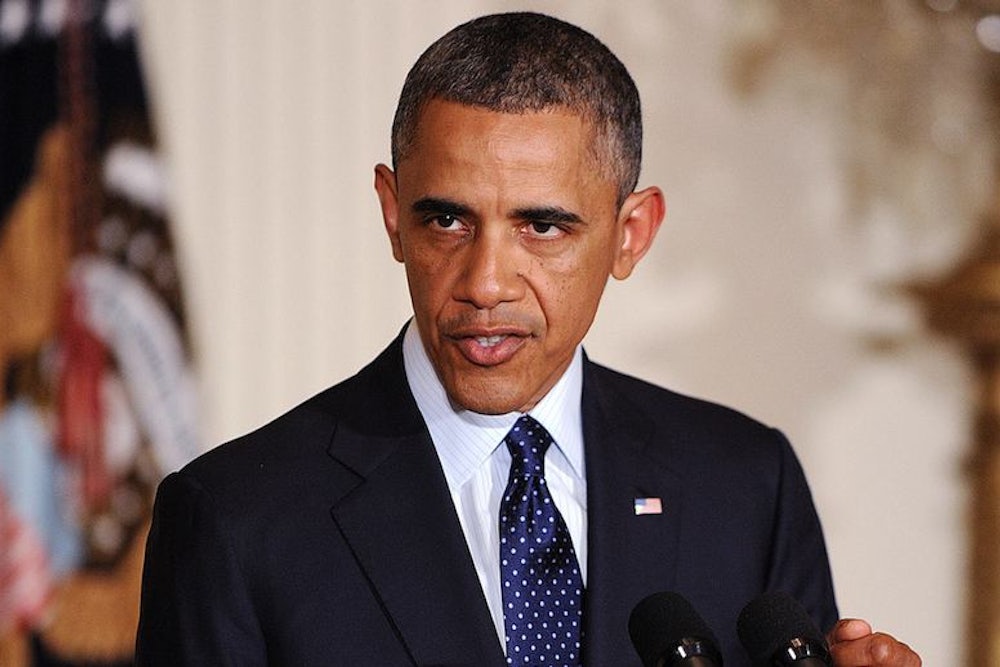It’s been a bad week for the president. Between revelations about the IRS’s targeting of the Tea Party and news of the Justice Department’s seizing the phone records from the Associated Press, an administration that promised a new sort of politics seems to have put itself in a position where Obama is being compared to Richard M. Nixon and George W. Bush. Obama’s supporters say the Nixon and Bush comparisons are unfair. And in many cases they’re right.
Take the Nixon comparison. On the one hand, it's true that in both administrations, the IRS engaged in outrageous political targeting. But it’s a hard to see a parallel. Yes, people from a hostile political camp were systematically scrutinized. But where Nixon’s political operation was intimately involved in targeted audits and other Watergate-era skullduggery, Obama’s IRS issues took place in the bowels of the bureaucracy, where workers focused special scrutiny on the portion of the political spectrum that featured most of the fundraising innovation between 2009 and 2012.
The Bush comparison, which focuses on the administration’s ferocious stance towards leaks and whistleblowers, initially seems more apposite. In an illuminating examination from 2012, Charlie Savage of the New York Times concluded that Obama had six leak related prosecutions under the Espionage Act, as opposed to only three under all previous presidents combined. Obama had touted this record to his Republican critics at the time as proof that he was hawkish on whistleblowing. In fact, Savage concluded, the crackdown didn’t reflect any personal involvement or directives from the president himself. “Instead,” he wrote, “it was unplanned, resulting from several leftover investigations from the Bush administration, a proliferation of e-mail and computer audit trails that increasingly can pinpoint reporters’ sources, bipartisan support in Congress for a tougher approach, and a push by the director of national intelligence in 2009 that sharpened the system for tracking disclosures.”
What’s more illuminating, in terms of this week’s swirling politics, is the way the administration talks about its controversial actions. To his credit, Obama immediately condemned the IRS profiling. But when it comes to the AP snooping controversy—or any other issue involving government secrecy—there’s a five-year history of cool-headed technocratic arrogance when it comes to issues involving government secrecy and transparency: The administration talks as if it believes that mandarin progressive elites know what’s best for the country, and any critic or whistleblower who challenges its judgments about national security should go through internal channels or be ruthlessly suppressed.
Therefore, even if the Obama administration’s dubious record in leak prosecution might be viewed as “accidental,” as Savage suggests, it also reflects a willful disengagement by both Obama and Attorney General Eric Holder, seemingly based on the technocratic over-confidence that a progressive administration must, by definition, be on the side of the angels. This reputation is one reason that even the overhyped IRS scandal may prove sticky.
Unlike Obama, George W. Bush never ran for president by touting his praise of government transparency and whistleblowing. As a result, while Bush never pretended to be a defender of whistleblowers, he was sensitive, at least in his first term, to avoiding subpoenas that might threaten press freedom. According to Savage, Bush’s first attorney general, John Ashcroft, ignored dozens of leak-related referrals from intelligence agencies because of a concern that they could only be pursued by subpoenaing reporters. Obama has no similar self-doubts about his own credentials as a First Amendment advocate: Didn’t he defend the American free speech tradition at the U.N. even as he put pressure on YouTube to reconsider its decision not to remove the Innocence of the Muslims video?
Because of this cognitive dissonance, the Obama administration has also invoked the 1917 Espionage Act to prosecute six suspected leakers, some of whom tried to blow the whistle on torture, even as it decided not to prosecute any of the suspected torturers.
And that law points to a better historic comparison. Obama’s rediscovery of the 1917 Espionage Act is grimly appropriate, since the president whose behavior on civil liberties he is most directly channeling isn’t, in fact, Richard Nixon or George W. Bush. It’s Woodrow Wilson. An enthusiastic supporter of Espionage Act prosecutions, the progressive, detached, technocratic Wilson was so convinced of his own virtue that he was willing to jail the Socialist candidate for president, Eugene V. Debs, for his mild criticism of the war, even as he championed progressive reforms such as the Federal Reserve and the Federal Trade Commission, both of them designed with the help of his economic advisor, Louis Brandeis.
Wilson had a sorry record on civil liberties, and once Brandeis was on the Supreme Court, he eloquently criticized the Wilson administration for its betrayal of progressive values such as free speech and transparency, declaring that “sunlight is the best disinfectant,” and unforgettably extolling the necessity of protecting political dissent.
Let’s hope today’s progressives teach the Wilsonian Obama a similar lesson.
